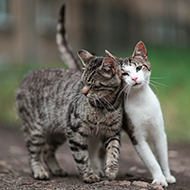
Parrots account for almost 80 per cent of all traded birds
Scientists have reported a huge fall in the number of birds being traded across the world since the 2005 EU ban on bird trade.
Figures published in the journal Science Advances show that, since the ban, the number of birds traded annually fell from around 1.3 million to 130,000.
‘The drastic drop in the global number of birds (legally) traded following the 2005 EU ban on bird trade underscores the importance of internationally coordinated policies in conservation,’ the authors write.
'The number of birds traded is one of the most important factors in determining avian invasion risk, and the EU bird trade ban has effectively reduced global bird invasion risks.’
Before the ban, European countries accounted for around 66 per of global bird imports, whereas West Africa was responsible for more than 70 per cent of bird exports. After the ban, Latin America became the main source and is now accountable for 50 per cent of the reduced global market.
Speaking to BBC News, author Dr Diederik Strubbe from the University of Copenhagen said: "There is some redirection of trade to other areas and some may have gone underground, but the global drop is so massive that those cannot account for it on their own.
"By implementing this ban the trade has effectively eliminated a lot of demand from the market and the main picture that emerges is that the trade has largely collapsed."
As well as a change in where the birds are coming from, there has also been a change in the type of birds being bought and sold.
Prior to the ban, the most commonly exported birds were Passerines, which include the yellow-fronted canary and the common waxbill. Today, it’s parrots that dominate the market, accounting for almost 80 per cent of all traded birds.
Dr Strubbe added: "The songbirds like canaries are only a fraction of what they were before, only 20 per cent of the former level.
"The other popular birds are parakeets they have also declined a bit, not to the extent of the songbirds. Despite the ban, they have remained rather popular on the global market and they have found new destinations."



 International Cat Care (ICatCare) has announced a free, virtual event dedicated to caring for unowned cats to explore new ideas and ways of working.
International Cat Care (ICatCare) has announced a free, virtual event dedicated to caring for unowned cats to explore new ideas and ways of working.